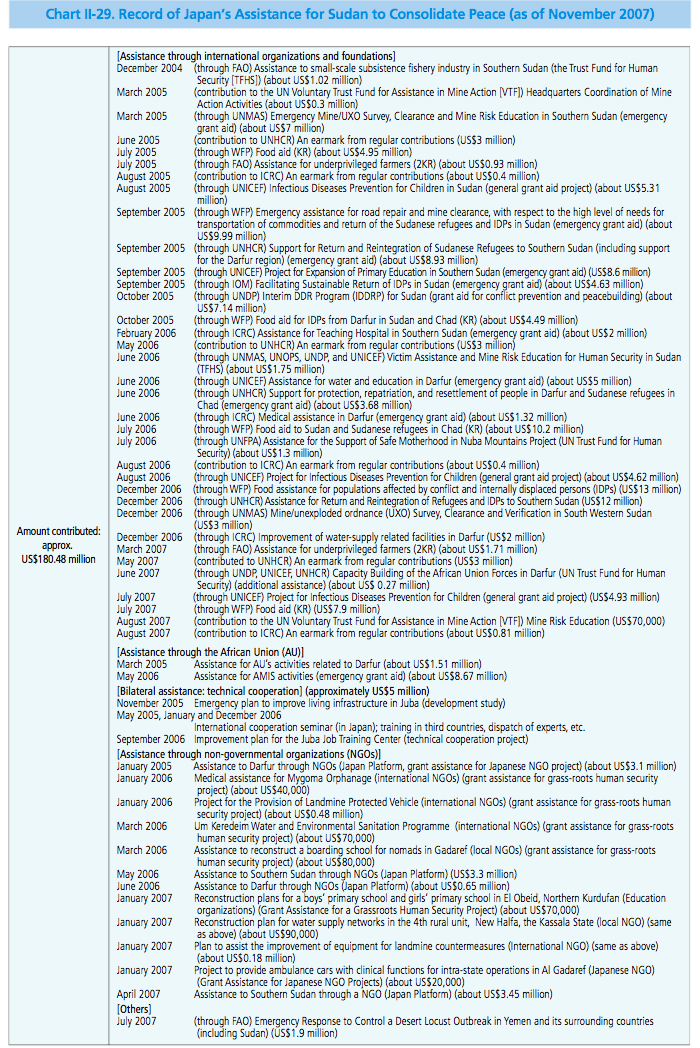Japan's Official Development Assistance White Paper 2007
Main Text > Part II ODA DISBURSEMENTS IN FISCAL YEAR 2005 > Chapter 2 Details about Japan's ODA > Section 2. Measures for Each of the Priority Issues > 4. Peacebuilding > (3) Sudan
(3) Sudan
<Overview>
In response to the conclusion of the North-South Comprehensive Peace Agreement (CPA), the Oslo Donors' Conference on Sudan was held in April 2005 in Norway, attended by representatives of more than 60 countries (including Japan), regions and organizations, as well as by then UN Secretary-General Kofi Annan, to garner broad international support for the implementation of this agreement. At the Oslo Conference, the representatives pledged a total amount of US$4.5 billion over three years from 2005 to 2007, surpassing the requested amount of assistance of US$4.1 billion.76 The pledged amount of assistance thus fulfilled the aim of strengthening coordinated assistance by the international community for the implementation of the peace agreement. The then Senior Vice-Minister for Foreign Affairs Ichiro Aisawa, who attended the conference as Japan's representative, pledged assistance in the amount of US$100 million for the near term in order to support the consolidation of peace in Sudan.
As of November 2007 Japan had provided assistance totaling approximately US$180 million, an amount that surpasses the aforementioned pledge amount, focused on assistance through multilateral organizations. More specifically, Japan has worked together with multilateral organizations and Japan's NGO to proactively provide assistance for returning and reintegrating refugees; the removal of, and education on, landmines and unexploded ordinances; the development of facilities related to water supply; the provision of medical assistance for counteracting pediatric infectious diseases; and for the supply of food aid.
Japan has also provided bilateral assistance. Specifically, Japan is conducting the emergency development study77 in Juba City including elements of community support, based on the approach of the African Village Initiative (AVI). In this effort, a full-scale local study was initiated in January 2006 together with urban planning assistance for Juba City, which is the capital of the southern regional government, and an emergency pilot project for improving the living environment, including the surrounding community. Japan is also strengthening the Juba Training Center through technical cooperation.78 International cooperation seminars were also held with the purpose of promoting the understanding necessary for implementing Japanese assistance projects in Sudan in the future.
<Darfur Conflict>
The Darfur conflict79 is being dealt with in the United Nations Security Council and the International Criminal Court, and is a great concern of international society. Concern was also voiced at the G8 Heiligendamm Summit, held in June 2007. Japan encouraged parties concerned, including the Sudanese Government, to make efforts toward its solution, in line with the UN Security Council. In addition to providing humanitarian aid, Japan provided US$85 million by November 2007 to support the activities of the African Union (AU), which plays a leading role in solving this problem.
Assistance to Sudan is a typical example of assistance for the "consolidation of peace," which Japan emphasizes as an important pillar of its policies for Africa. Japan will continue effort to enable Sudan to consolidate its peace.
Column 11 Sudan: Resolving the Greatest Humanitarian Crisis of the Century
Chart II-29. Record of Japan's Assistance for Sudan to Consolidate Peace (as of November 2007)



 Next Page
Next Page